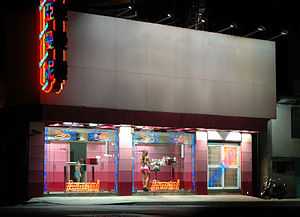Betel nut beauty

The term betel nut beauty (also betel nut girl – Chinese: 檳榔西施; pinyin: bīnláng xīshī; Pe̍h-ōe-jī: pin-nn̂g se-si) refers to a common sight along roadsides in Taiwan: a young woman selling betel nuts and cigarettes from a brightly lit glass enclosure while wearing revealing clothing. The Mandarin term names the women after Xi Shi, the legendary beauty of imperial China's Spring and Autumn Period. Though betel nuts are chewed in many regions of the Asia-Pacific, the betel nut beauty phenomenon is distinctly Taiwanese.
The original betel nut beauties were the "Shuangdong Girls" who, in the 1960s, brought glamour to the opening of the Shuangdong Betel Nut Stand in Guoxing Township (國姓鄉), Nantou County.[1] The success of the marketing strategy led competitors to follow suit, and by the end of the century betel nut beauties and their neon-topped kiosks were a trademark feature of Taiwan's cities and countryside. The kiosks appear in urban, suburban and rural settings alike.
As icons of Taiwanese culture, betel nut beauties appear frequently in art and film. Betelnut Beauty is the English title of the 2001 film Ai ni ai wo (愛你愛我, literally "Love you, love me"),[2] and betel nut beauties figure prominently in the 2007 art film Bangbang wo aishen (English title: Help Me, Eros).[3]
Controversy
Controversy surrounding betel nut beauties generally centers on two questions:
- the propriety of their revealing dress in public places and
- whether their dress marks them as victims of exploitation.
Betel nut beauties often hail from agricultural and working-class sectors of Taiwanese society. This has led some critics to regard their revealing dress as a sign of exploitation.[4] Other observers, such as Josephene Ho, coordinator of the Center for the Study of Sexuality at National Central University, see betel nut beauties as self-empowering: young women with few resources who better their economic situation by employing a marketing technique that requires confidence.[5]
See also
References
- ↑ Huang, Wan-tran (12 March 2007). "Why Pick on Betel-nut Beauties?". Taipei Times. Retrieved 13 November 2012.
- ↑ "Ai ni ai wo". IMDb. Retrieved 5 June 2009.
- ↑ "Bang bang wo ai shen". IMDb. Retrieved 5 June 2009.
- ↑ Asia Times Online. Betel nut brouhaha exposes disagreement Retrieved 1 December 2012
- ↑ Mo, Yan-chih (2005-05-22). "Betel-nut girls focus of exhibit". Taipei Times. Retrieved 2013-10-22.
Further reading
- Magnier, Mark (22 January 2009). "Taiwan's 'betel nut beauties' drum up business, and debate". Los Angeles Times. Retrieved 13 November 2012.
- Quartly, Jules (1 March 2007). "Bird-watching in Taiwan". Taipei Times. Retrieved 13 November 2012.
- Vembu, Venkatesan (30 January 2007). "The ‘betel-nut beauties’ of Taiwan". Daily News and Analysis (India). Retrieved 13 November 2012.
- Wang, Audrey (1 February 2008). "Betelnut Culture Turns Over a New Leaf". Taiwan Review. Retrieved 13 November 2012.
External links
| Wikimedia Commons has media related to Betel nut beauties. |
- Betelnut Beauties, An extensive Flickr photo set and discussion by Tobie Openshaw, who has been researching and documenting the girls for many years.
- , Illustrated TEDx talk on 8 years of documenting the subject